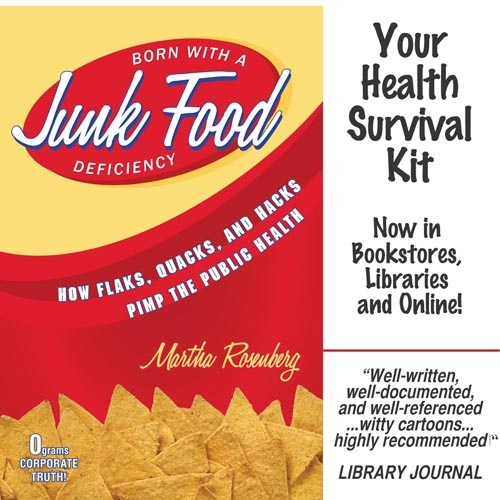
Two-thirds of U.S. adults are now overweight and one-third are obese, making normal-sized people an actual minority. Americans have so ballooned in size, government safety regulators worry that airline seats and belts won't restrain today's men, who average 194 pounds, and women, who average 165 pounds, in a crash.
Yet eating too much and exercising too little, considered the root of obesity, are not the only probable culprits. Here are some other factors that are often overlooked.
Livestock Growth Drugs
Is it possible that the growth promoters Agribiz uses to fatten U.S. livestock are also fattening people? Europe boycotts U.S. beef because of its oestradiol-17 and trenbolone acetate, hormones which it says are linked to prostate cancer, breast cancer and precocious puberty. European regulators have also disallowed antibiotics and arsenic used as growth promoters, which the U.S. allows. (Yes, arsenic.) Still, the mother of all growth promoters is ractopamine, an asthma-like drug given to 60 to 80 percent of U.S. pigs, 30 percent of ration-fed cattle and an undisclosed number of turkeys. Ractopamine, which few food activists are aware of, is given during the last weeks of life and not withdrawn before slaughter. Who allowed that?
Start 'em Young Marketing
Bad eating is learned young, and unfortunately some of the worst messages come from TV, parents and school. In a study in the journal Pediatrics, 4- to 6-year-olds who tasted identical graham crackers and gummy fruit snacks with and without cartoon characters "significantly preferred the taste of foods that had popular cartoon characters on the packaging." Researchers who studied 500,000 California middle and high school students found those with schools near fast food outlets were heavier. And another study of kids 12 to 19 found not one child ate a diet meeting all five of the American Heart Association's criteria. Even though almost one-third of U.S. children and teens are overweight, 84 percent of parents believe their children are at a healthy weight, say researchers, which compounds the problem.
Hooked on Cookies... and Chips and Pizzas and Häagen-Dazs®
For some overweight people, overeating is an actual addiction. Like alcoholism, food addicts are:
"... preoccupied with their drug (food). Whether they are thinking about their next meal, trying to suppress their cravings, planning their diet, feeling guilty about their last binge [or] hoping to find the strength to say no to that dessert or second helping," writes Arya M. Sharma, M.D.
Like alcoholics, they dream their troubled relationship to food can miraculously heal, perhaps if their brain readjusts its "set point" or they spend "an hour in the gym each day," says Sharma. The increase in food addiction might correlate with the decrease in family meals, indicates some research. Studies by the National Center on Addiction and Substance Abuse reveal that food and other addictions are less likely to develop in children of families who eat together three times a week. Who remembers family meals?
Lifestyle Factors
There's another habit we learn (or don't learn) while growing up that can contribute to obesity too -- a strict bedtime, which few adults or children observe anymore. After just six nights of getting only four hours of sleep, healthy young volunteers showed signs of pre-diabetes, reports the Chicago Tribune. Other studies show sleep-deprived adults are more likely to be fat, regardless of how much they exercise and what they eat. Why? Researchers hypothesize that sleep deprivation changes levels of the hormone ghrelin (that tells the brain to eat), leptin (that tells the brain we're full) and the stress hormone cortisol. There's even another lifestyle contribution to obesity: room temperature. ABC News reported that air conditioning can add weight by sparing the body the need to regulate temperature, which is a mechanism that burns fat.
Government Duplicity
Is the government really helping people to slim down and avoid foods that pack on pounds and invite risk heart disease? High-saturated-fat foods like cheese? Not according to a New York Times expose in 2010. A USDA group with 162 employees called Dairy Management, mostly funded by farmers, is shamelessly committed to getting people to double and triple their cheese intake to replace profits from falling milk sales. According to the Times, Dairy Management has supported Pizza Hut, Taco Bell, Burger King, Wendy's and Domino's in "cheesifying" their menu options, putting dairy farmers' profits before consumer health. "If every pizza included one more ounce of cheese, we would sell an additional 250 million pounds of cheese annually," rhapsodized the Dairy Management chief executive in a trade publication. Dairy Management received $5.3 million from the USDA during one year, for an overseas dairy campaign, which almost equals the total $6.5 million budget of USDA's Center for Nutrition Policy and Promotion. That's the group that tells people not to eat high fat milk and cheese!
 An earlier version of this report appeared on Alternet.org.
An earlier version of this report appeared on Alternet.org.
Martha Rosenberg's new book, Born With a Junk Food Deficiency, was recently featured on CSPAN2's Book TV.
For more by Martha Rosenberg, click here.
For more on health news, click here.